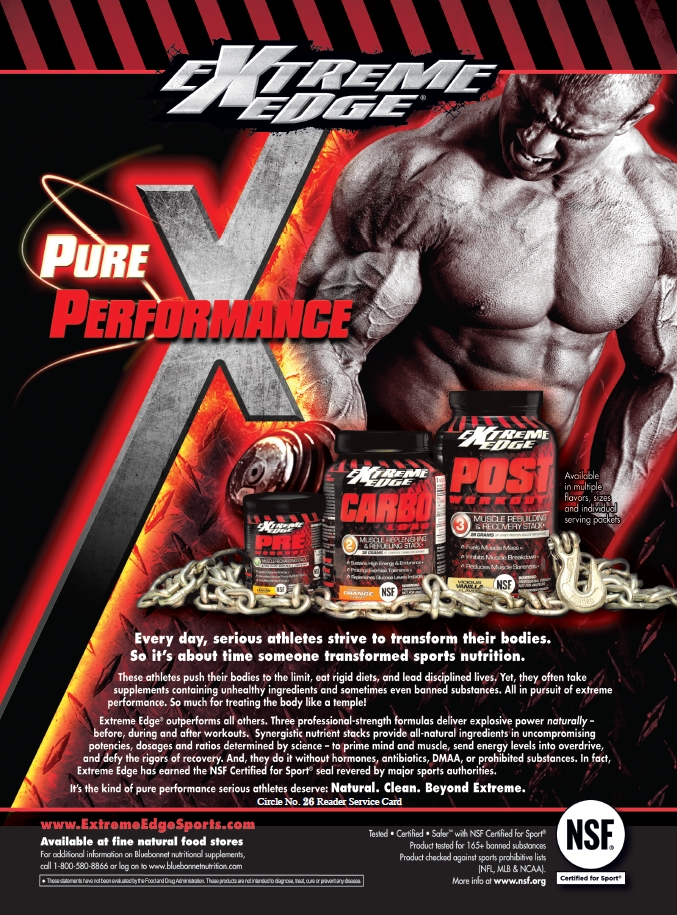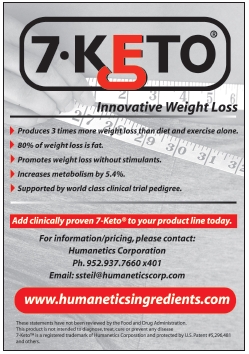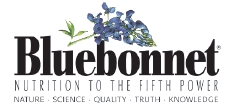Part One of a Five-Part Series on Sports Nutrition
As the weather heats up, many of your customers will be ramping up their physical activity levels. Accordingly, WholeFoods has decided to provide you with five months of education on Sports Nutrition. The subjects we’ll cover within this fast-growing natural products segment include Foods and Drinks for Athletes, Energy and Endurance, Muscle Support, Respiratory Support and this month’s topic, Weight Management.
Keeping a healthy weight is something all individuals can work on; though those who are overweight may have the most to gain by losing, sculpting the body to achieve greater levels of fitness is often the athlete’s endeavor as well. “This creates a major synergy between weight management products and techniques and sports nutrition,” says Neil E. Levin, CCN, DANLA, nutrition education manager for NOW Foods, Bloomingdale, IL. From body builders, to track athletes, to those who wish to shed some pounds to improve their long-term health, supplements are here to help.
Methods of Control
There are, of course, some hot items in this category these days, and waves of popularity for new supplements can breed both excitement and caution in weight management circles.
Take the recent case of DMAA as an  example. The U.S. Food and Drug Administration (FDA), after years of combating the controversial ingredient, sent out a consumer advisory in April stating once and for all that the agency views DMAA as illegal and dangerous (negative cardiovascular side effects have been cited), effectively banning the ingredient from the supplement market. The few companies that still included DMAA in formulas have reluctantly begun to remove it, and speaking at a recent tradeshow, Daniel Fabricant, Ph.D., director of FDA’s division of dietary supplement programs, reiterated the agency’s firm position (1) (2).
example. The U.S. Food and Drug Administration (FDA), after years of combating the controversial ingredient, sent out a consumer advisory in April stating once and for all that the agency views DMAA as illegal and dangerous (negative cardiovascular side effects have been cited), effectively banning the ingredient from the supplement market. The few companies that still included DMAA in formulas have reluctantly begun to remove it, and speaking at a recent tradeshow, Daniel Fabricant, Ph.D., director of FDA’s division of dietary supplement programs, reiterated the agency’s firm position (1) (2).
A once popular ingredient, now dead. What lessons can be learned? “DSHEA works if the FDA enforces it correctly; DMAA is the perfect example,” says Michael Smith, M.D., senior health science specialist with Life Extension, Fort Lauderdale, FL. The Dietary Supplement Health and Education Act has been targeted as too lax of a regulatory framework by critics of the industry. But Smith explains that companies selling DMAA provided FDA with studies on its safety and efficacy, and FDA ruled that this scientific support was insufficient. “Case closed. There’s no need to give more unchecked power to the FDA when DSHEA protects the public as it was designed to do,” he says.
The case also illustrates, however, the unrivaled regulatory focus on this segment of the supplement industry. Therefore, “reputability, efficacy and safety are bigger issues in this category than any other,” says Paul Dijkstra, CEO of InterHealth Nutraceuticals, Benicia, CA.
“A lot of the controversy over weight management products involves adulterated raw materials that contain steroids and steroid precursors, diet drugs or erectile-dysfunction drugs that improve performance,” says Levin, adding that his company has turned to proprietary ingredient screening methods that it has made efforts to share with the industry.
There is also the not-so-small issue of the New Dietary Ingredient (NDI) draft guidance, which the whole supplement industry must hash out with FDA. “The current controversy around NDIs is also a challenge for all companies selling weight loss products. My opinion is that once we have a clear understanding of the new policy and it is enforced, several of the suspect weight loss products will simply not exist in the marketplace,” says Scott Steil, president of Nutra Bridge, Shoreview, MN.
When it comes to the results claims made by products in this segment, Mandy M. Voisin, director of R&D for RightWay Nutrition, Bluffdale, UT, offers a piece of advice. “Don’t be afraid to ask a company for a copy of the clinicals they state on their website or product box. If they are a credible source, they will have no problem emailing you a copy,” she says.
Luckily, it appears some of the currently popular options for weight management are the real deal. “Green coffee bean (GCB) and Garcinia cambogia are both superfoods that come from India, and contain natural active compounds that are thought to support healthy weight management,” says Lindsey Duncan, ND, CN, founder and CEO of Genesis Today, Austin, TX. He adds, “GCB contains antioxidant compounds called chlorogenic acids, which are believed to slow the absorption of sugars and simple carbohydrates from the gut into the bloodstream, which, in turn, may provide positive benefits for healthy blood sugar level maintenance.”
 As attention to GCB has skyrocketed due to media mentions and subsequent consumer interest, many have been eager to see if the scrutiny will lead to any positive scientific results. “One of the studies in support of GCB was published in the Diabetes Metabolic Syndrome and Obesity Journal. This 22-week crossover study was conducted to examine the efficacy and safety of GCB in reducing weight and body mass in 16 overweight adults,” says Voisin.
As attention to GCB has skyrocketed due to media mentions and subsequent consumer interest, many have been eager to see if the scrutiny will lead to any positive scientific results. “One of the studies in support of GCB was published in the Diabetes Metabolic Syndrome and Obesity Journal. This 22-week crossover study was conducted to examine the efficacy and safety of GCB in reducing weight and body mass in 16 overweight adults,” says Voisin.
Subjects in that study received a commercial GCB extract (GCA) in a high dose of 1,050 mg, a low dose of 700 mg or a placebo in separate six-week periods, with two-week washouts in between. Significant reductions in body weight, body mass index (BMI) and body fat percentage were observed while subjects took the extract, without significant changes to overall diet. According to Smith, subjects experienced a 32% drop in blood sugar spikes and averaged 17 pounds of weight loss after 12 weeks on GCB extract (3).
Garcinia cambogia, meanwhile, contains the natural compound hydroxycitric acid (HCA), Duncan says. “HCA is thought to support the body’s capacity for energy production and calorie burning,” he explains. Dijkstra says that a proprietary extract of HCA bound to calcium and potassium (Super CitriMax from InterHealth) can also help suppress appetite. “Randomized, double-blind, placebo-controlled studies demonstrate not only weight loss and fat-burning benefits, but also increased satiety corresponding to an increase in serotonin availability,” he says (4).
Garcinia fruits also contain the unique compound garcinol, according to Anurag Pande, Ph.D., vice president of scientific affairs at Sabinsa Corp., East Windsor, NJ. Garcinol is thought to increase the absorption of HCA, making it more available to the body’s cells. Pande says Garcinia cambogia helps to manage weight by neutralizing a crucial enzyme in the formation of fatty acids, ATP citrate lyase. It also stimulates fat oxidation through the activation of l-carnitine transferase, he explains. This increase in fat metabolism plays a role in stimulating glycogen storage in the liver, causing a state of satiety and hunger suppression.
A proprietary blend of another garcinia plant, Garcinia mangostana, with Sphaeranthus indicus flower heads (Meratrim from InterHealth) has been shown to help reduce body weight, BMI and waist circumference, according to Dijkstra. He says these effects are achieved by modulating fat accumulation while increasing fat breakdown.
Two predominant mechanisms of action are  found in weight management ingredients, says Chase Hagerman, business development and marketing manager for Chemi Nutra, White Bear Lake, MN, and both have already been alluded to in discussing the hot options above. One category is thermogenics (supplements that stimulate the metabolism to burn calories), and the other is appetite suppressants. Smith says this dynamic can also be described as “more out” vs. “less in.” “White kidney bean and green coffee extracts top the ‘less in’ category. They decrease the action of sugar and starch-digesting enzymes,” Smith says. He cites fucoxanthin as a leading player in the “more out” category. It is non-stimulatory, Smith explains, yet it helps stubborn white fat, or adipose tissue, to be metabolized more efficiently.
found in weight management ingredients, says Chase Hagerman, business development and marketing manager for Chemi Nutra, White Bear Lake, MN, and both have already been alluded to in discussing the hot options above. One category is thermogenics (supplements that stimulate the metabolism to burn calories), and the other is appetite suppressants. Smith says this dynamic can also be described as “more out” vs. “less in.” “White kidney bean and green coffee extracts top the ‘less in’ category. They decrease the action of sugar and starch-digesting enzymes,” Smith says. He cites fucoxanthin as a leading player in the “more out” category. It is non-stimulatory, Smith explains, yet it helps stubborn white fat, or adipose tissue, to be metabolized more efficiently.
In addition to fucoxanthin, Steil lists 7-Keto, green tea extract, capsaicin, caffeine and CLA among top thermogenic or metabolism-boosting compounds. For satiety, he tabs fiber, saffron and carraluma, and says that no ingredient necessarily leads the pack in this segment. He lists chromium, white kidney bean and a proprietary extract of brown seaweeds (InSea2 from innoVactiv) for help with blood sugar control. By blocking both starch and sugar assimilation through the inhibition of enzymes, this seaweed ingredient was shown to benefit insulin levels and insulin sensitivity after carbohydrate ingestion (5).
The best approach to weight management will vary from person to person, Levin says. Those with an excessive appetite can try filling up on fiber and water before meals, or they can turn to satiety supplements. Satiety ingredients can support adherence to strict calorie restrictions, according to Hagerman. He says that once one such ingredient (PhosphoLean from Chemi Nutra) is in the intestinal tract, the N-oleoyl ethanolamine it contains begins to regulate feeding by binding to cell receptors responsible for signaling the brain to decrease appetite.
“Saffron extract, sourced from the exotic saffron spice, has been shown in research to help control appetite and reduce hunger,” says Rob Maru, chief innovation officer of Reserveage Organics, Gainesville, FL. He says that a study published in Nutrition Research showed a proprietary saffron extract (Satiereal from P.L. Thomas) benefited appetite control, helping to reduce the feeling of hunger and need to snack between meals (6).
Steve Kravitz, president of Earth’s Bounty, Vancouver, WA brings up glucomannan, a dietary fiber found concentrated in the root of the konjac plant. It can help to suppress appetite, he says, in part by reducing the hormone ghrelin, which stimulates the desire for high-calorie foods (7). He says that African mango is another supplement option for weight that studies show is promising.
 Moving from the realm of “less in” to “more out,” Bob Green, president of Nutratech, Inc., West Caldwell, NJ, describes for us a bitter orange extract thermogenic ingredient (Advantra Z from Nutratech). “Research has not only shown that Advantra Z helps burn fat and calories, but also that it increases energy and the percentage of lean muscle mass—all of which are necessary for long-term weight management and overall fitness,” Green says. The ingredient helps to stimulate beta-3 receptors, which are found in every cell wall and he says are responsible for triggering thermogenesis, thereby increasing the resting metabolic rate.
Moving from the realm of “less in” to “more out,” Bob Green, president of Nutratech, Inc., West Caldwell, NJ, describes for us a bitter orange extract thermogenic ingredient (Advantra Z from Nutratech). “Research has not only shown that Advantra Z helps burn fat and calories, but also that it increases energy and the percentage of lean muscle mass—all of which are necessary for long-term weight management and overall fitness,” Green says. The ingredient helps to stimulate beta-3 receptors, which are found in every cell wall and he says are responsible for triggering thermogenesis, thereby increasing the resting metabolic rate.
Because it does not cross the fatty membranes of the blood-brain barrier, this bitter orange extract doesn’t cause negative central nervous system side effects, according to Green. It is stored in peripheral tissue rather than the brain. It also makes minimal contact with certain excitatory alpha and beta receptors that can trigger cardiovascular side effects. A new safety study using 75 subjects corroborates this safety at high dosages, says Green (8).
The natural active compound in this ingredient also has something over its synthetic counterpart. “The long half-life of the dominant amine, p-synephrine, exhibits approximately twice the physiological activity compared to an equal weight of synthetic p-synephrine, so it displays sustained energy hours after ingestion without a sharp decline in effectiveness,” says Green (9).
In addition to the thermogenic substances already discussed, Levin tabs guarana and l-carnitine. Green tea, he adds, is beneficial because it contains multiple compounds (epigallocatechin gallate (EGCG) and l-theanine, along with caffeine) that can benefit weight management. For those in whom an underactive thyroid may be causing weight issues, Levin lists iodine, l-tyrosine and the Ayurvedic herb guggul as options. To supply the body, and thus the metabolism, with a general source of energy, he suggests B vitamins and energy cofactors like CoQ10.
Apart from these options, Levin also emphasizes that probiotics like bifidobacteria are correlated with healthy weight in both infants and adults, and that having low numbers of these beneficial bacteria at birth has been correlated to being overweight later in life. “Overweight mothers give birth to neonates that have a decreased number of bifidobacteria, which suggests that obesogenic microbiota is an ‘inheritable’ trait. In adults, the number of bifidobacteria is lower in individuals with obesity and type-2 diabetes mellitus,” he says.
A patented derivation of soluble fiber from  corn (Calorease from SFI) is a viable weight management aid, according to information provided by Soho Flordis International, Sydney, Australia. The fiber is called FBCx, and its benefit to weight control comes from an ability to bind with up to nine times its own weight in dietary fat. When taken before a meal, this fiber coats and binds to fat droplets in a way that makes them resistant to being digested or absorbed, allowing them to instead be eliminated as waste. A study in the journal Obesity found that alpha-cyclodextrin (the chemical name for the fiber component) significantly decreased body weight, cholesterol and insulin levels in overweight men and women (10).
corn (Calorease from SFI) is a viable weight management aid, according to information provided by Soho Flordis International, Sydney, Australia. The fiber is called FBCx, and its benefit to weight control comes from an ability to bind with up to nine times its own weight in dietary fat. When taken before a meal, this fiber coats and binds to fat droplets in a way that makes them resistant to being digested or absorbed, allowing them to instead be eliminated as waste. A study in the journal Obesity found that alpha-cyclodextrin (the chemical name for the fiber component) significantly decreased body weight, cholesterol and insulin levels in overweight men and women (10).
A distinctive, metabolism-based approach to weight control is described by Jamie Spell, managing director of Nutraceuticals International Group, Paramus, NJ. A proprietary ingredient (a-Lacys Reset from Nutraceuticals International) that synergistically combines alpha lipoic acid (ALA) and cysteine has been shown to modulate cell redox balance, she says.
The cysteine neutralizes existing free radicals, by promoting the synthesis of the primary antioxidant glutathione. By reducing free radical production, aerobic metabolism can be improved. This means that fat can be burned more efficiently, aiding weight loss, while preserving the body’s lean mass percentage. “Collected data confirmed that the higher the fat mass, the stronger the lipolytic effect,” Spell says of the ingredient.
Kravitz highlights the importance of a clean colon. “The small intestine is a site for the absorption of nutrients,” he says, so even if you’re eating healthily, you might not be getting the full effect with an unclean colon. Another benefit relates directly to weight management: Kravitz says some people will lose multiple pounds just by doing a colon cleanse, along with improving their absorption of nutrients from food and any supplements they are taking.
Stephen A. Center, M.D., a San Diego-based, anti-aging certified physician and medical director for Earth’s Bounty, cites many of the same herbal supplements that Kravitz does for weight management, and adds apple pectin. Another in the laundry list of supplements given a profile boost by Dr. Oz, pectin is a fiber found in fruits that may help with digestive issues as well as cholesterol (11). Center also points to the importance of amino acids, noting that they help produce l-carnitine, which can enhance mitochondrial ATP production. This will indeed lead to more energy, but the relationship between amino acids and weight management goes beyond energy.
 Less Body Fat, More Lean Mass
Less Body Fat, More Lean Mass
Amino acids form proteins, and “the quality of protein are important when looking to support healthy weight management,” says Susan Hazels Mitmesser, Ph.D., director of nutrition research for Solgar, Leonia, NJ. Supplements like whey and soy protein isolates, which can provide all of the essential amino acids necessary to build muscle, are a good place to start. All muscle is metabolically active, meaning that the more of it there is, the more calories will be expended. Hazels Mitmesser says that even if there is extra protein that does not get converted to lean muscle, the body will spend more energy in getting rid of excess protein than it will on carbohydrates or fats.
Deer antler spray is an option Kravitz is fond of, as he says it has the ability to help reduce body fat and encourage lean body mass. Lean body mass is defined simply as the mass of the body minus its fat content. When attempting to reshape the body for the long haul, lean body mass is crucial. “Deer antler works by mimicking the metabolite of HGH, and it increases growth factors,” says Kravitz. He explains that one reason the bodies of younger people have higher metabolic efficiency, and can therefore reshape themselves more readily, is the presence of growth factors such as IGF-1. The supplies of these growth factors decline dramatically with age, Kravitz says, and this can make it harder to shed weight.
Reshaping the body does require biochemical manipulation, Smith agrees. “This is why I like fucoxanthin so much. It helps your body to express the protein called UCP-1, or uncoupling protein-1 inside white fat cells,” he says. When activated, UCP-1 helps metabolize fat stored inside the cell.
A patented Coleus forskohlii root extract (ForsLean from Sabinsa) contains the active compound forskolin. Pande says, “The mechanism of action for Coleus forskohlii on weight management is quite unique.” It activates adenylate cyclase, which is involved in the production of cyclic AMP. This secondary cell messenger helps to activate lipase for the breakdown of fat. The ingredient, Pande notes, does not rely on stimulating adrenergic receptors for its effect, and therefore does not produce unwanted side effects.
Conjugated linoleic acid (CLA) can help improve body composition, according to Hazels Mitmesser. Information provided by Met-RX, Bohemia, NY, indicates that CLA is believed to work by modulating oxidative enzyme activity as well as energy metabolism, though research is ongoing. “CLA boasts numerous studies as to its ability to enhance body composition—specifically lean body mass—when used for long periods of time (typically over a year),” Levin says.
One study found that compared with placebo, those who supplemented with CLA for a year achieved a nearly 9% lower Body Fat Mass and a nearly 2% higher lean body mass on average (12). Later studies corroborated these results over a shorter supplementation time frame, and found that the fat loss was targeted to specific areas of the body (13).
Visceral fat, or fat in and around the abdomen, responds  most effectively to diet and exercise, according to Green. When we lose weight and tone muscle, visceral fat tends to shrink away.
most effectively to diet and exercise, according to Green. When we lose weight and tone muscle, visceral fat tends to shrink away.
Supplements can provide support in this process. “One ingredient, high-linoleic safflower oil (HLA), has been scientifically shown to specifically reduce belly fat and increase the production of adiponectin, an important hormone that directly attacks belly fat,” says Maru. A 36-week, double-blind study compared HLA to CLA supplementation in 55 overweight post-menopausal women. CLA reduced BMI and total adipose mass, and HLA reduced torso adipose mass, while increasing lean body mass and adiponectin (14).
“Too often we focus on the scale, and not the shape of the body, which is interesting when you consider that muscle is five times heavier than fat,” says Steil. He emphasizes the importance in weight management of losing pounds without losing lean muscle. 7-Keto, a non-stimulant thermogenic that increases fat-burning enzyme activity, is found naturally in our bodies but declines with age, according to Steil. Clinical studies have linked 7-Keto with fat loss, without any destruction of lean muscle (15).
Pande emphasizes that when trying to address the ratio of visceral fat to lean body mass, we should look at the whole picture. “It may also be beneficial to address certain pathological symptoms of excess visceral fat deposition, such as cholesterol and blood sugar levels, metabolic syndrome, stress, etc.,” he says.
This focus on reshaping the body alongside weight loss is one place where the weight management and sports nutrition markets intersect. “There is definitely some overlap between the weight management and sports nutrition supplement categories. Even athletes want to burn fat, although comparatively, they may have less to burn,” says Voisin. She points to an option like beta alanine which, like other supplements discussed, is thought to help burn fat while also promoting lean muscle growth.
There are also ancillary benefits to some weight management products that make them attractive to physically active people. The bitter orange thermogenic ingredient discussed earlier has been shown to increase exercise tolerance, a quality much sought after by athletes and bodybuilders, Green notes.
Yo-Yo No More
Losing weight vs. keeping it off: the eternally frustrating dynamic that plagues dieters everywhere. Obviously, lifestyle changes must be first and foremost if your customers are to win this battle. “Otherwise, you’re going to do the ‘yo-yo’ diet,” says Kravitz, referring to the dreaded weight rebound. Addressing the reasons for overeating, like stress and blood sugar, and committing to exercise are both important.
Duncan adds that with so much contrasting nutrition information available, many just don’t know what healthy eating is. He says, “In my opinion, ‘healthy eating’ is the process of choosing foods with the highest amount of nutrients to serve as high-quality fuel for the body, rather than defaulting to foods that taste the best and satisfy cravings.” Levin suggests eating nutrient-dense whole foods that will satisfy hunger before larger meals. To help avoid weight rebounds through supplementation, Kravitz recommends chromium for its ability to positively influence carbohydrate metabolism and blood sugar.
An example of clinical supplement research incorporating lifestyle changes, at least over a short term, involves the ingredients described earlier by Dijkstra. “Study participants walked five days a week and followed a standard calorie diet (2,000 kcal/day), as opposed to being placed on a low-calorie diet which is a common practice in weight control studies,” he says. Including such parameters in a study, Dijkstra feels, reflects real-life weight loss scenarios, and therefore the results are more applicable to the personalized weight loss plans many devise on their own.
When low-calorie diets are the route of choice, another issue comes into play. “Calorie restrictive diets often lead to very stressed out individuals. When the body gets used to consuming and expending a certain amount of energy, it’s not going to be easy to deviate from the norm,” says Hagerman.
|
Select Weight Management Offerings The following products and ingredients are available from companies interviewed in this piece. Chemi Nutra: PhosphoLean Earth’s Bounty: Oxy-Cleanse, Diet Factor 5, Longevitrol Genesis Today: Garcinia Cambogia, Moringa, Carulluma Fimbriata, Green Coffee Bean with Svetol, Magnoia Bark, Ultimate Resveratrol, Raspberry Ketone, Saffron, 4Weight Control InterHealth Nutraceuticals: Super CitriMax, Meratrim Life Extension: Calorie Control Weight Management Formula with CoffeeGenic, Integra-Lean Irvingia, 7-Keto DHEA Metabolite, HCA, Optimized Chromium with Crominex 3+, Super CLA Blend with Sesame Lignans Met-RX: CLA Myoleptin 1500 Nature’s Plus: SynaptaLean Rx-Fat Loss, Eternal Lean, Quick Body Lean (each contain Synaptose) NOW Foods: Diet Support, CLA Extreme, Citrin, Super Cortisol Support, Slimaluma Plus, NOW Energy, NOW Thyroid Energy, T-Lean, Phase 2, Glucomannan, NOW Clinical GI Probiotic Nutra Bridge: 7-Keto, InSea2 Nutraceuticals International: a-LACYS RESET, FucoPure, Slimpro Nutratech: Advantra Z Reserveage Organics: RE-BODY Green Coffee Bean Extract, SafSlim, Hunger Chews, Hunger Caps RightWay Nutrition: Green Coffe, Green Coffee + Energy, Garcinia Cambogia, Raspberry Ketones, Moringa Oleifera, African Mango Edge, Beta Burn, Superfruit Fat Burner Sabinsa Corp.: ForsLean, Garcitrin, LeanGard, Fabenol, Citrin, CitrinK SOHO Flordis International: Calorease Solgar: Whey To Go Protein Powder Natural Vanilla, Chocolate, and Strawberry Flavors, Iso-Soy Soy Protein/Isoflavone Concentrated Powder Natural Vanilla Bean and Chocolate Caramel Flavors, Tonalin CLA 1300 mg Softgels |
The stressfulness of such diets, which can lead to not reaching diet goals, can be lessened with mood improvements. A recent study on one ingredient (PhosphoLean) proves how difficult it is to maintain such diets. While taking 300 mg of the ingredient, 34 males and females aged 18–46 were told to reduce their caloric intake by 30% over eight weeks. The results found most participants failing to reach weight loss goals due to an inability to restrict their calories sufficiently. But, Hagerman notes, those in the PhosphoLean group had more favorable moods and were less fatigued.
A prior study, using a dose of about 650 mg, showed a more dramatic effect. 138 overweight and obese individuals attempted to follow a low-calorie diet over eight weeks. The group that took the ingredient had a dropout rate of 6%, compared with 27% for the placebo group. The experimental group also had improved insulin resistance, decreased depressive symptoms, feelings of satiety and a decreased desire to binge eat, according to Hagerman (7).
While many people understand that we can promote healthy mood with options like Saint John’s Wort or SAMe, they don’t always realize that willpower can be improved, too, according to Rafael Avila, manager of R&D for Nature’s Plus, Melville, NY. “The National Institutes of Drug Addiction recently indicated that overeating is directly connected to the brain’s reward center. Lack of dopamine, or a poor ability to sense and respond to dopamine, causes feelings of stress, anxiety, discomfort, etc.,” says Avila.
On the flip side, sufficient biochemical rewards result in feelings of fullness and satisfaction after a meal. “People with poor dopamine function often satisfy their excessive cravings with unhealthy fat and sugar-rich foods. Essentially, with poor dopamine function, you need more and more food in order to feel satisfied,” he says. A healthier way to gain satisfaction is by increasing sensitivity to dopamine. A patented blend of amino acids and herbs called Synaptose, Avila says, has been shown to measurably increase dopamine and dopamine sensitivity. It also is associated with an increase in serotonin and endorphins, both important neurotransmitters for the brain’s reward center.
The effects of this “neuro-adaptagen,” beyond normalized cravings, include improved energy regulation, enhanced vitality, focus, reduced stress and anxiety and increased feelings of happiness, according to Avila. “This not only helps the individual lose the weight but keep it off once and for all,” he says.
Stress, Kravitz says, can indeed impact one’s weight in multiple ways, but luckily it can be addressed directly through supplementation. The herb ashwagandha can help to reduce levels of the stress hormone cortisol. This can in turn increase energy, as well as cut carb cravings and overeating, thus helping to avoid stress-related weight gain, he says.
Overeating due to chronic stress can be remedied through lifestyle techniques, Levin says, in combination with dietary supplements that support the adrenal glands’ management of cortisol. He lists rhodiola, phosphatidyl serine, reishi mushroom, vitamin C and vitamin B5 for helping to control cortisol. A patented combination of extracts from Magnolia officinalis bark and Phellodendron amurense bark, Levin says, helps to quiet the hypothalamic-pituitary-adrenal axis, which responds to stress.
Spell also directs our attention toward the oxidative type of stress. “When not compensated for, the oxidative process can lead to a degenerative cascade,” she says, explaining that neutralizing reactive oxygen species can help fight aging and weight gain, while improving sport performance. WF
This sports nutrition series is sponsored by
References
1. P. Kime, “Supplement maker agrees to remove DMAA from products,” Air Force Times, http://www.airforcetimes.com/article/20130417/NEWS/304170024/Supplement-maker-agrees-remove-DMAA-from-products, accessed May 2, 2013.
2. D. Fabricant, “FDA Update,” Speech presented at SupplySide Marketplace, New York, NY (2013, April).
3. J.A. Vinson, et al., “Randomized, double-blind, placebo-controlled, linear dose, crossover study to evaluate the efficacy and safety of a green coffee bean extract in overweight subjects,” Diabetes Metab. Syndr. Obes. 5, 21-7 (2012).
4. H.G. Preuss, et al., “An overview of the safety and efficacy of a novel, natural(-)-hydroxycitric acid extract (HCA-SX) for weight management,” J. Med. 35(1-6), 33-48 (2004).
5. M.E. Paradis, et al., “A randomised crossover placebo-controlled trial investigating the effect of brown seaweed (Ascophyllum nodosum and Fucus vesiculosus) on postchallenge plasma glucose and insulin levels in men and women,” Appl. Physiol. Nutr. Metab. Epub Nov. 16 2011.
6. B. Gout, et al., “Satiereal, a Crocus sativus L extract, reduces snacking and increases satiety in a randomized placebo-controlled study of mildly overweight, healthy women,” Nutr. Res. 30(5), 305-13 (2010).
7. S. Chearskul, et al., “Immediate and long-term effects of glucomannan on total ghrelin and leptin in type 2 diabetes mellitus,” Diabetes Res. Clin. Pract. 83(2):e40-2 (2009).
8. G.R. Kaats, et al., “A 60-Day Double-Blind, Placebo-Controlled Safety Study Involving Citrus aurantium (Bitter Orange) Extract,” Food Chem. Toxicol. 55(5), 358–62 (2013).
9. Stohs, “Stereochemical and Physiological Differences Between Naturally Occurring p Synephrine and Synthetic p Synephrine,” (2011).
10. K.B. Comerford, “The Beneficial Effects alpha-Cyclodextrin on Blood Lipids and Weight Loss in Healthy Humans,” Obesity 19, 1200–1204 (2011).
11. “Pectin,” WebMD, http://www.webmd.com/vitamins-supplements/ingredientmono-500-PECTIN.aspx?activeIngredientId=500&activeIngredientName=PECTIN&source=3, accessed April 30, 2013.
12. J.M. Gaullier, et al., “Conjugated linoleic acid supplementation for 1 y reduces body fat mass in healthy overweight humans,” Am J Clin Nutr. 79(6), 1118-25 (2004).
13. J.M. Gaullier, et al., “Six months supplementation with conjugated linoleic acid induces regional-specific fat mass decreases in overweight and obese,” Br J Nutr. 97(3), 550-60 (2007).
14. L.E. Norris, et al., “Comparison of dietary conjugated linoleic acid with safflower oil on body composition in obese postmenopausal women with type 2 diabetes mellitus,” Am. J. Clin. Nutr. 90(3), 468-76 (2009).
15. J.L. Zenk, et al., “HUM5007, a novel combination of thermogenic compounds, and 3-acetyl-7-oxo-dehydroepiandrosterone: each increases the resting metabolic rate of overweight adults,” J. Nutr. Biochem. 18(9), 629-34 (2007).
16. M. Rondanelli, et al., “Administration of a dietary supplement (N-oleyl-phosphatidylethanolamine and epigallocatechin-3-gallate formula) enhances compliance with diet in healthy overweight subjects: a randomized controlled trial,” Brit. J. Nutr. 101(3), 457-464 (2009).
Published WholeFoods Magazine, June 2013












